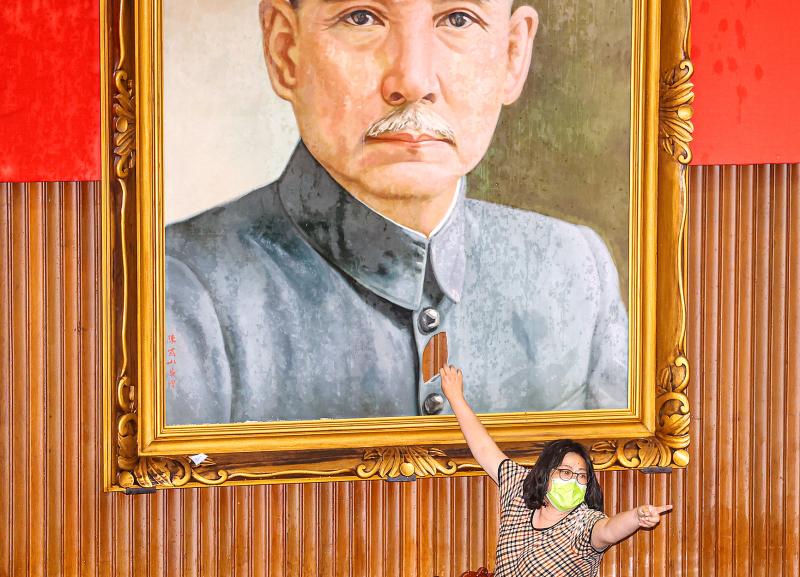A large portrait of Sun Yat-sen (孫逸仙) hanging in the main legislative chamber should be removed, along with bringing an end to an oath to Sun that takes place in front of the image during swearing-in ceremonies, Democratic Progressive Party (DPP) Legislator Tsai Yi-yu (蔡易餘) said on Monday.
Such symbols are a form of “personality cult worship” and have no place in the legislature, he added.
A letter of request has been sent to Legislative Yuan Secretary-General Lin Jih-jia (林志嘉) to have the portrait sold by an auction house such as Sotheby’s after its value is assessed, Tsai said.

Photo: CNA
“Portraits as symbols of authoritarianism are seldom on display in the parliaments of democratic countries, as they are places of dignity and solemn proceedings,” he said.
Sun’s portrait was damaged on May 30 when Chinese Nationalist Party (KMT) members threw containers of water during a contentious legislative session, with one piercing the portrait. The incident occurred as the DPP was attempting to approve amendments to the Accounting Act (會計法) that were seen to benefit former president Chen Shui-bian (陳水扁) by possibly exonerating him of 11-year-old corruption charges.
“Sun as the founder of the KMT headed the party as the first Republic of China president,” Tsai said. “Our legislature is not a place for personality cult worship.”
“These KMT devotees attacked lawmakers during the legislative session and damaged the portrait of their divine icon. This desecration by the party’s worshipers against their highest deity would probably increase the value of the portrait,” he said.
After his death in 1925, KMT leaders often had people show deference to Sun in official ceremonies, and mandated that his portrait hang in schools and government offices.
Lin’s office replied to the letter of request, saying that the legislature plans to ask the KMT to pay compensation for damage and repair costs, and that the Ministry of Culture would consult with art experts to assess restoration options, Tsai said.
The office’s reply also said that all parties in the legislature would need to agree to the portrait’s sale, if that were to be proposed, he added.
Officials said provisions of the National Emblem and National Flag of the ROC Act (中華民國國徽國旗法) mandate that the national flag and Sun’s portrait be displayed front-and-center of the main chambers of government offices.
DPP legislators including Fan Yun (范雲) in 2020 proposed amendments to the Presidential and Vice Presidential Oath Act (總統副總統宣誓條例) and the Oath Act (宣誓條例) to remove portraits of Sun from government offices.
After the May 30 incident, Fan wrote on social media: “Taiwanese democracy need no longer bow and pledge oath to this symbol of authoritarianism... We call on KMT members to support amendments for a more democratic procedure on the swearing-in ceremonies for lawmakers and civil servants.”
DPP Legislator Lin Chun-hsien (林俊憲) said: “Members of the public have different ideas about Sun Yat-sen, which are varied and complicated just like the different identities and political affiliations among Taiwanese.”
“Around the world we find very few countries display images of deceased leaders, at least not in such a prominent place such as the legislative chamber,” he said. “No nation is founded and built by one person. Now that even KMT lawmakers are not concerned about damaging this portrait, it is the right time to take it down.”

Beijing could eventually see a full amphibious invasion of Taiwan as the only "prudent" way to bring about unification, the US Department of Defense said in a newly released annual report to Congress. The Pentagon's "Annual Report to Congress: Military and Security Developments Involving the People's Republic of China 2025," was in many ways similar to last year’s report but reorganized the analysis of the options China has to take over Taiwan. Generally, according to the report, Chinese leaders view the People's Liberation Army's (PLA) capabilities for a Taiwan campaign as improving, but they remain uncertain about its readiness to successfully seize

Taiwan is getting a day off on Christmas for the first time in 25 years. The change comes after opposition parties passed a law earlier this year to add or restore five public holidays, including Constitution Day, which falls on today, Dec. 25. The day marks the 1947 adoption of the constitution of the Republic of China, as the government in Taipei is formally known. Back then the Chinese Nationalist Party (KMT) governed China from Nanjing. When the KMT, now an opposition party in Taiwan, passed the legislation on holidays, it said that they would help “commemorate the history of national development.” That

Taiwan has overtaken South Korea this year in per capita income for the first time in 23 years, IMF data showed. Per capita income is a nation’s GDP divided by the total population, used to compare average wealth levels across countries. Taiwan also beat Japan this year on per capita income, after surpassing it for the first time last year, US magazine Newsweek reported yesterday. Across Asia, Taiwan ranked fourth for per capita income at US$37,827 this year due to sustained economic growth, the report said. In the top three spots were Singapore, Macau and Hong Kong, it said. South

Snow fell on Yushan (Jade Mountain, 玉山) yesterday morning as a continental cold air mass sent temperatures below freezing on Taiwan’s tallest peak, the Central Weather Administration (CWA) said. Snowflakes were seen on Yushan’s north peak from 6:28am to 6:38am, but they did not fully cover the ground and no accumulation was recorded, the CWA said. As of 7:42am, the lowest temperature recorded across Taiwan was minus-5.5°C at Yushan’s Fengkou observatory and minus-4.7°C at the Yushan observatory, CWA data showed. On Hehuanshan (合歡山) in Nantou County, a low of 1.3°C was recorded at 6:39pm, when ice pellets fell at Songsyue Lodge (松雪樓), a